Health
Vaccinating migrants like US children would have prevented disease outbreaks at Chicago shelters: experts
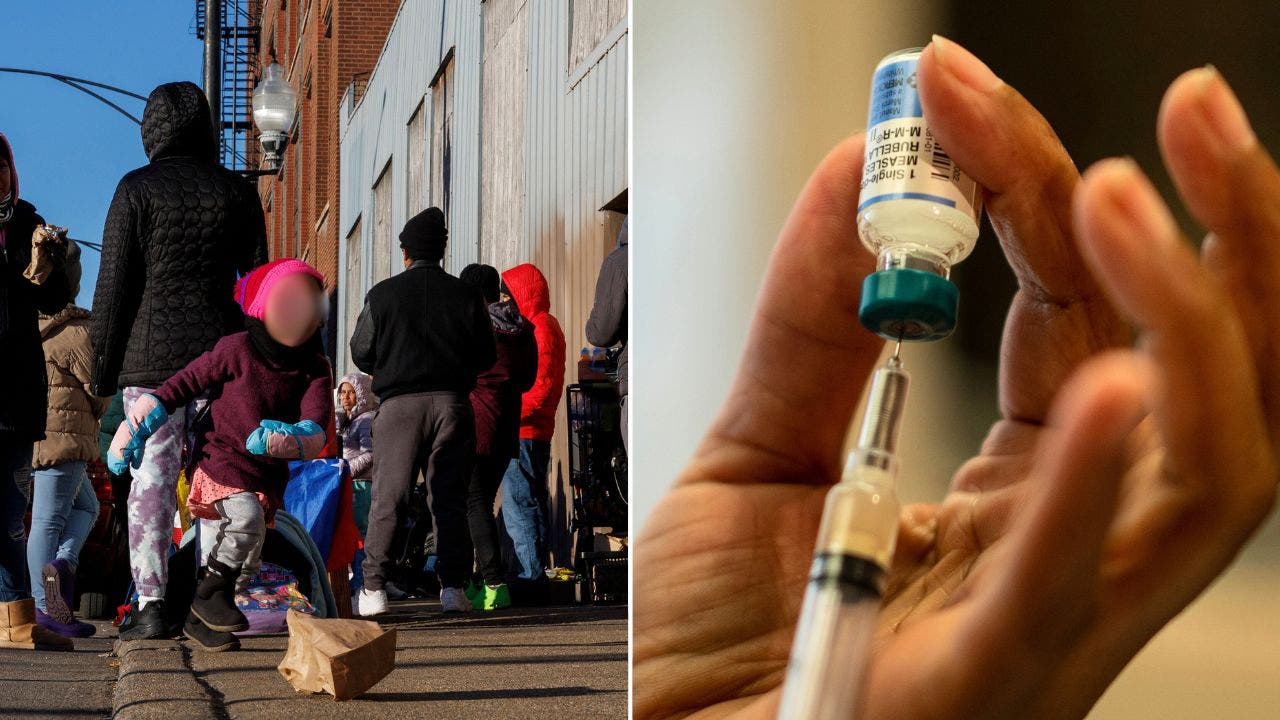
The alarming outbreak of measles and tuberculosis (TB) at migrant shelters in Chicago could easily have been avoided if the illegal migrants had been vaccinated at the border and if they weren’t living in cramped conditions, two medical experts tell Fox News Digital.
Chicago health officials said Wednesday that a “small number” of TB cases were reported at some migrant facilities, following reports of dozens of measles cases at these facilities.
Concerns are quickly growing that these cases will multiply and spread to the general population in the Windy City. There are also fears that similar outbreaks could occur in other sanctuary cities such as New York, Boston and Denver — jurisdictions that are also packing migrants into makeshift shelters and hotels.
Unlike most U.S.-born children who have to follow strict vaccination schedules, migrant students were, up until last month, not required to be vaccinated in order to attend school in Chicago under an exemption for children living in unstable housing, according to reports. In New York City, migrant students were also given waivers at the start of the 2023-2024 school year.
READ MORE OF FOX NEWS’ COVERAGE OF THE BORDER CRISIS
A student in Florida with measles. (iStock )
At least two students who tested positive for measles were living at Chicago’s Pilsen migrant shelter, although it is unclear at the time of this publication if they had been vaccinated.
Amid the outbreak, Chicago moved to vaccinate all migrants at its shelters. Fox News Digital reached out to the Chicago Board of Education, the mayor’s office and the Chicago Department of Public Health (CDPH) about vaccination procedures and exemptions but did not receive a response.
Nearly 40,000 migrants have arrived in Chicago since August 2022, according to the city’s “New Arrivals Situational Awareness Dashboard.” Migrants who are stopped at the border and then released into the general population are rarely medically screened or given vaccines. Legal migrants, like Green Card holders, are required to be vaccinated for a range of inoculations as part of their approval process.
Dr. Janette Nesheiwat, a New York City-based double board-certified doctor, says the outbreaks at the Chicago migrant shelters were easily foreseen.
“To be honest, I’m not surprised. We have open borders with all sorts of people coming in from countries from all over the world bringing in various illnesses, viruses, disease and bacterial infections,” Nesheiwat says.
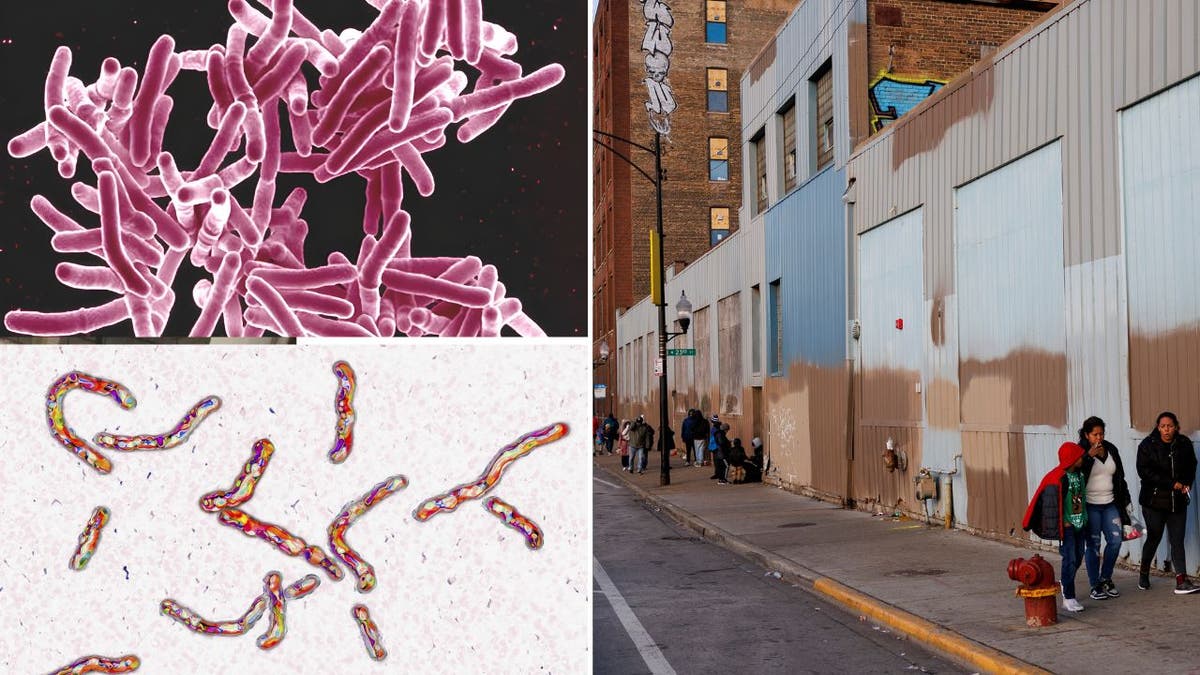
Tuberculosis under a microscope, left, and a Chicago migrant shelter, right. (Armando L. Sanchez/Chicago Tribune/Tribune News Service via Getty Images, right, NIH/NAID/IMAGE.FR/BSIP/Universal Images Group via Getty Images, top left, BSIP/Universal Images Group via Getty Images, bottom left.)
Measles is a highly contagious and serious airborne disease that can lead to severe complications and even death, especially in children. It is characterized by a fever as high as 105°F and malaise, cough, coryza and conjunctivitis followed by spots and a rash, according to the Centers for Disease Control and Prevention (CDC).
Tuberculosis, meanwhile, is also transmitted in airborne particles and typically affects the lungs but can also affect other parts of the body such as the kidney, spine, and brain.
The measles outbreak at the shelters could easily have been prevented if migrants were given the highly effective measles, mumps and rubella (MMR) vaccine, Nesheiwat says. However, the tuberculosis vaccine is generally not administered in the U.S. due to its low success rate. Instead, good hygiene and preventing people from living in cramped conditions is the best way to stop tuberculosis from spreading, she explains.
“Tuberculosis is a lung infection and one of the most common lung infections worldwide, it impacts millions of people,” Nesheiwat says.

Dr. Janette Nesheiwat, a New York City-based double board-certified doctor, and, Dr. Marty Makary, a Johns Hopkins health policy expert and surgeon, right. (Fox News)
TUBERCULOSIS BREAKS OUT AT CHICAGO MIGRANT SHELTERS FOLLOWING MEASLES CASES
Tuberculosis cases jumped by around 1,300 cases last year to more than 9,600, the highest total in a decade, according to the CDC. As of March 28, there were 97 confirmed cases of measles in the U.S., shattering last year’s 58 cases total.
“You can catch tuberculosis if someone is coughing or sneezing or in close contact, the bacteria from those particles gets into the air and anybody nearby will breathe that in and that’s how they pick it up and that’s how they catch it,” Nesheiwat says. “It’s concerning to those who may have weak immune systems or who have underlying medical problems like asthma, lung disease, heart disease.”
Tuberculosis is not as contagious as COVID, Nesheiwat says, and you would have to be around someone for a long period of time or be in crowded areas like shelters in order to catch it.
“The good news is we have treatment for it, but the not-so-good news is the treatment is for six to 12 months of treatment of multiple antibiotics,” Nesheiwat says. “What’s scary is that there are some strains of tuberculosis that are resistant to the typical antibiotics.”
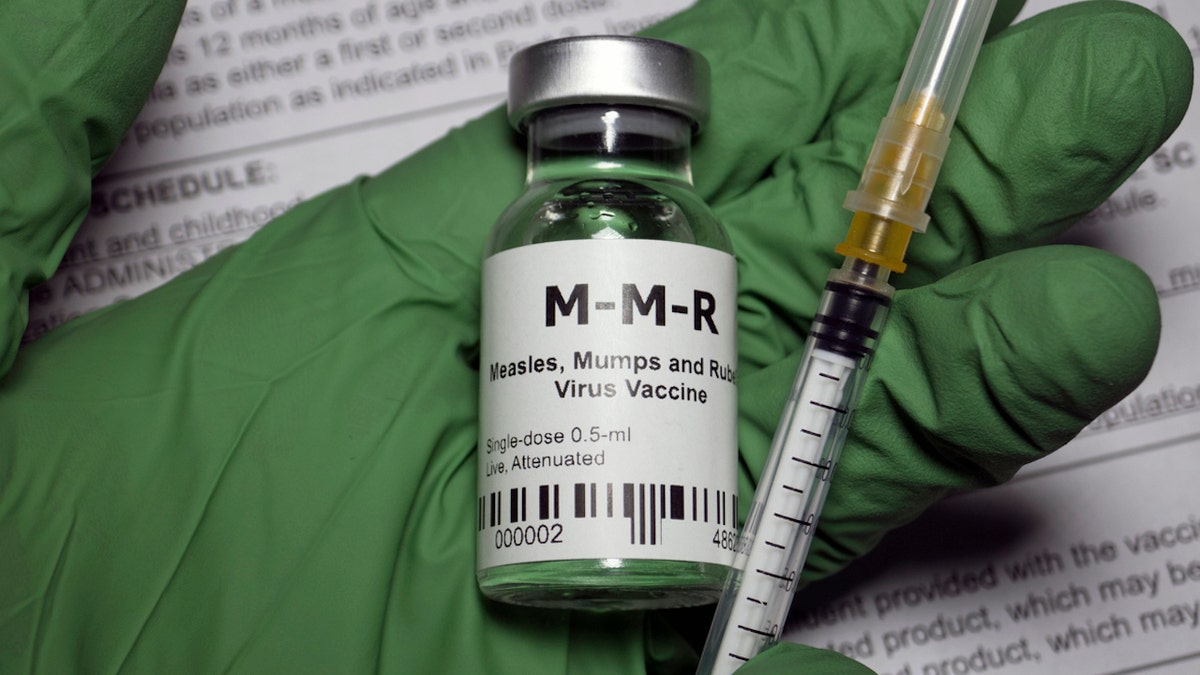
A measles, mumps, and rubella vaccine, which doctors say is very effective at preventing measles. (iStock)
She also raised fears that migrants who are put on these medications may not follow through with the treatment, which could lead to pockets of outbreaks being replicated throughout the country, adding that it’s hard for health officials to keep tabs on their schedule.
Dr. Marty Makary, a Johns Hopkins health policy expert and surgeon, says conditions at the migrant shelters are now a public health concern given that tuberculosis can convert into a chronic disease with “a constellation of health complications affecting almost every organ system in the body.”
“The reports of the crowding are that it is the worst it’s ever been in recent history. We’re seeing outbreaks in highly susceptible populations that are preventable,” Makary explains. “One of the sort of basics in public health is that when people in a crowded area become sick, they should be separated. They should not be in close contact with others when they have no choice, then that is a recipe for an outbreak.”
“However,” Makary continues, “the amount of time spent in the shelter has decreased, suggesting that people may manifest the infection after their time in the shelter.”
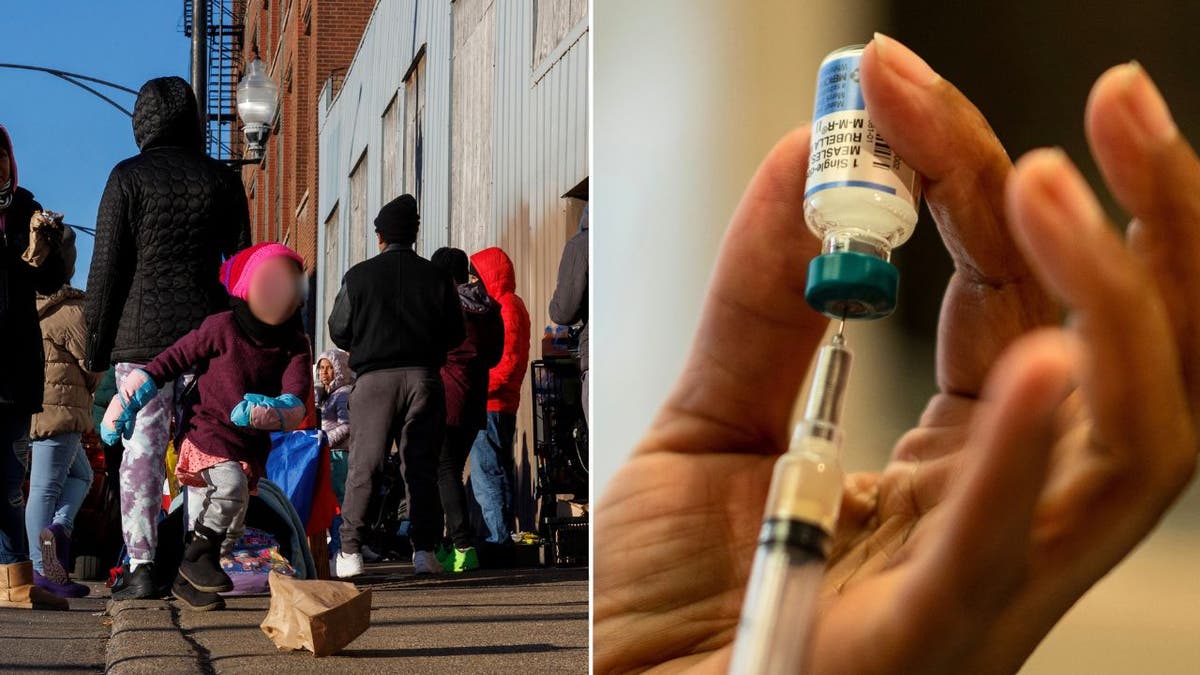
A migrant child running, left and an MMR vaccine, right. (Armando L. Sanchez/Chicago Tribune/Tribune News Service via Getty Images, left, Johannes Eisele/AFP via Getty Images, right)
CHICAGO MAYOR URGES BIDEN TO GRANT WORK PERMITS TO HALF MILLION ILLEGAL IMMIGRANTS
He said that measles is typically not fatal, but can cause permanent health damage in the children who acquire it.
The MMR vaccine, while highly effective, does not provide instant immunity in the week in which it’s administered, he says.
“So I think their issue in Chicago is they’re discovering cases of measles after the fact,” he explains. “I don’t think there is a significant risk to the public, because most people are vaccinated against measles while tuberculosis requires some kind of direct interaction. But a migrant who is sick not only needs help, but they also need some degree of precaution.”
Nesheiwat says a measles infection can lead to brain inflammation, blindness, deafness and pneumonia.
“You’re protecting against serious, potentially life-threatening, infections or complications,” Nesheiwat says of the MMR vaccine. “There is a high rate of effectiveness with these vaccines, so the outbreak was absolutely preventable.”
Nesheiwat also says she has been giving shots to migrants attending public schools in New York City, where around 180,000 migrants have arrived since 2022. The city’s board of education tells Fox News Digital that students in temporary housing are still not asked for immunization records or immigration status before they enroll in schools, although they are required to follow the CDC’s immunization catch-up requirements.

Migrants wait in a long line overnight hoping to receive a placement in a New York City shelter in December. (Getty Images )
A CDC report found that about 3% of children entering kindergarten in the 2022–2023 school year were given an exemption in their state — the highest level ever recorded.
With the recent spike in measles and tuberculosis, Nesheiwat says that people should be making sure they are getting their annual physical checkups in order to stay healthy.
“That’s when we listen to your heart and your lungs and check your vital signs,” Nesheiwat says. “And if you’re having any symptoms like prolonged cough or fever, night sweats, chills, weight loss, see your doctor. Don’t put it off, don’t delay because the earlier we can begin treatment, the earlier we can diagnose you and the better the outcomes.”

Health
Find Yourself Waking up Dizzy? This Is What Doctors Want Women Over 50 To Know

Sign Up
Create a free account to access exclusive content, play games, solve puzzles, test your pop-culture knowledge and receive special offers.
Already have an account? Login
Forgot your password?
Get back to the Sign In
Use left and right arrow keys to navigate between menu items.
Use escape to exit the menu.
Health
Pregnancy-related deaths back down to pre-pandemic levels, CDC data says
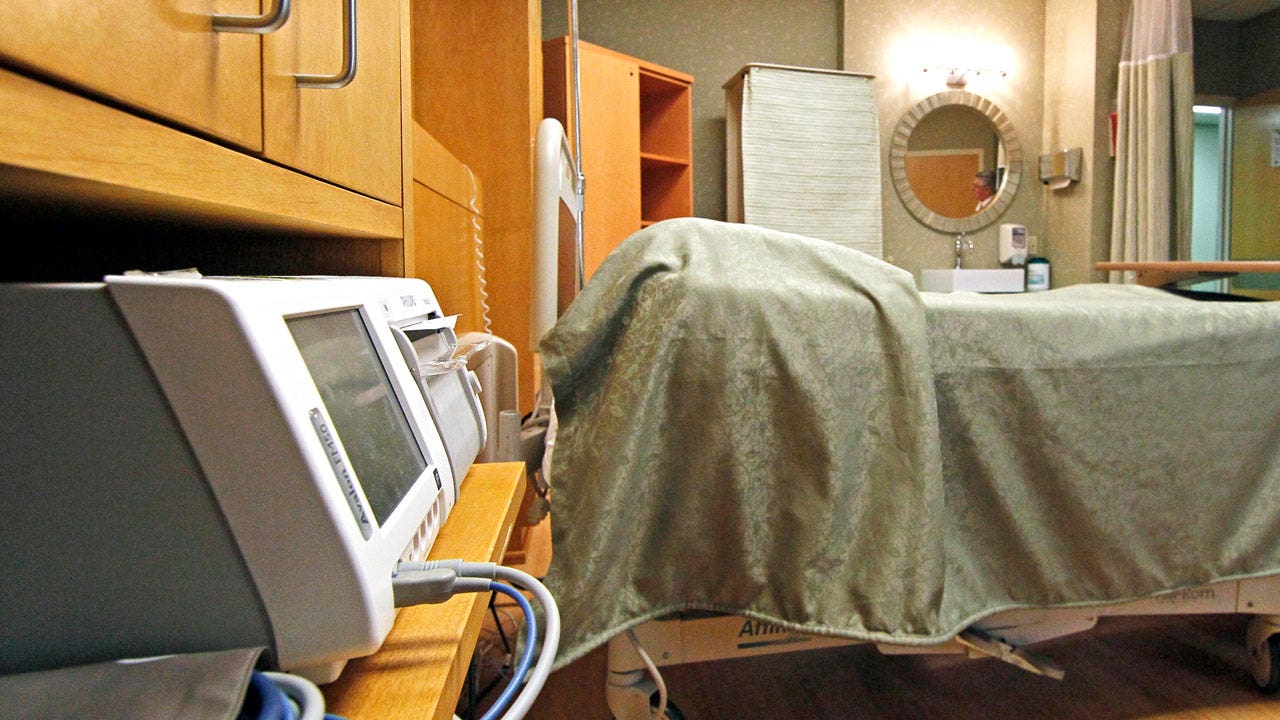
U.S. pregnancy-related deaths have fallen back to pre-pandemic levels, new government data suggests.
About 680 women died last year during pregnancy or shortly after childbirth, according to provisional CDC data. That’s down from 817 deaths in 2022 and 1,205 in 2021, when it was the highest level in more than 50 years.
COVID-19 seems to be the main explanation for the improvement, said Donna Hoyert, a Centers for Disease Control and Prevention maternal mortality researcher.
US BIRTHS SAW NOTABLE DECREASE IN 2023, MARKING END TO LATE PANDEMIC REBOUND, EXPERTS SAY
The coronavirus can be particularly dangerous to pregnant women. And, in the worst days of the pandemic, burned out physicians may have added to the risk by ignoring pregnant women’s worries, experts say.
Fewer death certificates are mentioning COVID-19 as a contributor to pregnancy-related deaths. The count was over 400 in 2021 but fewer than 10 last year, Hoyert said.
The agency on Thursday released a report detailing the final maternal mortality data for 2022. It also recently released provisional data for 2023. Those numbers are expected to change after further analysis — the final 2022 number was 11% higher than the provisional one. Still, 2023 is expected to end up down from 2022, Hoyert said.
A room in a Mississippi hospital maternity ward is seen on Oct. 11, 2012. In 2023, U.S. pregnancy-related deaths fell back to pre-pandemic levels, according to data released by the Centers for Disease Control and Prevention on May 2, 2024. (AP Photo/Rogelio V. Solis, File)
The CDC counts women who die while pregnant, during childbirth and up to 42 days after birth from conditions considered related to pregnancy. Excessive bleeding, blood vessel blockages and infections are leading causes.
There were about 19 maternal deaths for every 100,000 live births in 2023, according to the provisional data. That’s in line with rates seen in 2018 and 2019.
But racial disparities remain: The death rate in Black moms is more than two-and-a-half times higher than that of white and Hispanic mothers.
“In the last five years we’ve really not improved on lowering the maternal death rate in our country, so there’s still a lot of work to do,” said Ashley Stoneburner, the March of Dimes’ director of applied research and analytics.
The advocacy organization this week kicked off an education campaign to get more pregnant women to consider taking low-dose aspirin if they are at risk of preeclempsia — a high blood pressure disorder that can harm both the mother and baby.
There are other efforts that may be helping to lower deaths and lingering health problems related to pregnancy, including stepped-up efforts to fight infections and address blood loss, said Dr. Laura Riley, a New York City-based obstetrician who handles high-risk pregnancies.
But there’s a risk that those kinds of improvements are being offset by a number of factors that may reduce the ability of women to get medical care before, during and after a birth, she said. Experts say the list includes the closure of rural hospitals and a 2022 U.S. Supreme Court decision that did away with the federally established right to abortion — and contributed to physician burnout by causing doctors to feel constrained about providing care during pregnancy-related medical emergencies.
“I think there’s good news. We’re making strides in certain areas,” said Riley, head OB-GYN at Weill Cornell Medicine. “But the bad news and scary news is … there are these other political and social forces that make this (reducing maternal deaths) difficult.”
Health
Eating one type of fruit regularly could reduce diabetes risk in women, study suggests: 'Incredibly healthy'

Eating avocados could be helpful when it comes to avoiding diabetes.
A new study published in the Journal of the Academy of Nutrition and Dietetics identified a link between eating avocados and reduced diabetes risk in some Mexican adults.
Researchers studied the dietary habits and diabetes diagnosis data from the Mexican National Survey of Health and Nutrition in the years 2012, 2016 and 2018.
BROWN SEAWEED CONSUMPTION COULD HELP MANAGE AND PREVENT TYPE 2 DIABETES, STUDY SHOWS
Of the 25,640 qualified respondents aged 20 and older, approximately 59% were female and more than 60% had abdominal obesity.
About 45% of participants reported eating avocados daily — 34.7 grams on average for men, and 29.8 grams for women.
Avocado eaters of both genders have an overall more nutritious diet, according to Medical News Today. (iStock)
“Among women, this study showed that compared to avocado non-consumers, avocado consumers had more than 20% lower odds of diabetes even after adjusting for various factors such as age, education level, body weight, physical activity and more,” said study author Feon Cheng, PhD, a nutrition epidemiologist at the Avocado Nutrition Center in Mission Viejo, California, in a statement to Fox News Digital.
(Cheng noted that her affiliation with the Avocado Nutrition Center did not influence the research methods or analysis.)
TYPE 2 DIABETES A MUCH GREATER RISK FOR ‘NIGHT OWLS’ THAN FOR EARLY BIRDS, A ‘STARTLING’ NEW STUDY FINDS
“This research is especially important considering that Hispanic adults are more likely to develop diabetes in their lifetime than U.S. adults overall and at a younger age,” Cheng said.
The same diabetes-reducing effects were not observed in men.
“It is interesting that there were differences between men and women, which may be attributed to different lifestyle factors,” Cheng noted.

Diabetes-reducing effects were observed in female study participants — but the same benefits were not found in men, per this research. (iStock )
“Although we did not compare lifestyle factors in this study, it warrants future research to explore whether they may help explain the difference seen between men and women.”
They also noted that avocados contain “numerous vitamins, minerals and phytochemicals, which can contribute to reducing the risk of metabolic syndrome and diabetes.”
SPINACH VS. KALE: WHICH IS ‘BETTER’ FOR YOU? NUTRITIONISTS SETTLE THE GREAT DEBATE
Tanya Freirich, a registered dietitian nutritionist in Charlotte, North Carolina, was not involved in the study, but told Fox News Digital that avocados are “an incredibly healthy food choice.”
The fruit is “full of omega-3 fats, low in carbohydrates, and high in fiber, magnesium, potassium and vitamins C, E and K,” the nutritionist pointed out.
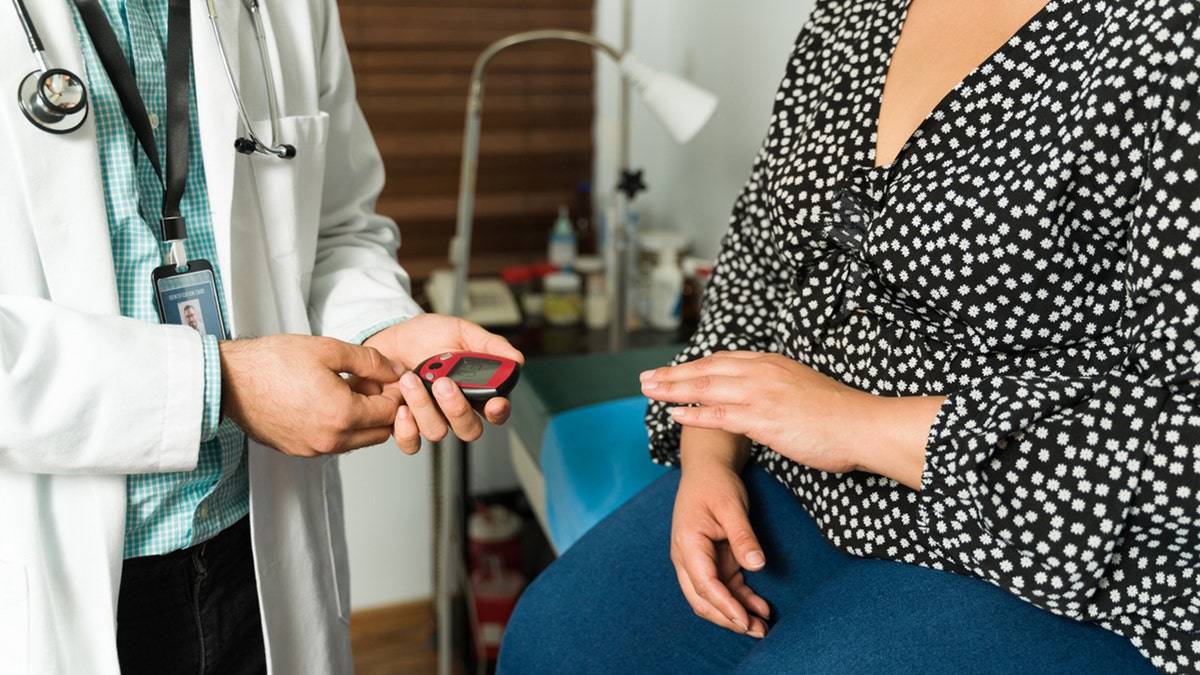
Diabetes is the second leading cause of death in Mexico, according to the National Institute of Health. (iStock)
Consuming avocados, however, will not completely negate unhealthy food and lifestyle choices, Freirich said.
“While it makes sense that this low glycemic index and nutritious food could be associated with a reduced risk of diabetes, I recommend that people also take into consideration the rest of their diet,” she advised.
YOUR DIABETES RISK MAY DOUBLE IF YOU EAT THIS FOOD TWICE A WEEK, SAYS HARVARD RESEARCHERS
“To reduce your diabetes risk even further, in addition to adding avocados as part of your overall healthy eating pattern, also work on reducing added sugars, choosing high-fiber whole grains and consuming plenty of vegetables.”

People should adhere to a well-balanced diet to reduce diabetes risk, a nutritionist advised. (iStock)
Michelle Routhenstein, a New York-based preventive cardiology dietitian at EntirelyNourished.com, seconded the notion that avocados alone will not help lower diabetes risk. (She was not involved in the study.)
“We need to assess the whole diet, balance of meals and snacks, timing of eating, and other lifestyle factors like stress management, sleep quality and physical activity,” she told Fox News Digital.
MAKE IT: TOM BRADY’S FAVORITE AVOCADO ICE CREAM
New Jersey-based registered dietitian Erin Palinski-Wade, a consultant for the HASS Avocado Board, shared with Fox News Digital that she is “not surprised” at the new study’s conclusions about reduced diabetes risk and consumption of fresh avocado.
“Unlike most other fruits, avocados contain zero grams of naturally occurring sugar per serving and do not affect the glycemic response,” she said.

Avocados are a source of “good fats, fiber and a variety of vitamins and minerals,” according to a nutritionist. (iStock)
“A serving of avocado (one-third of a medium avocado or 50 grams) also provides a good source of fiber, which helps manage blood sugar levels,” Palinski-Wade added.
Previous research has shown that adding avocados to a meal could offer a “variety of benefits, such as lower post-meal glucose levels and improved satiety,” the nutritionist told Fox News Digital.
Consuming avocados will not completely negate unhealthy food and lifestyle choices, experts warned.
Scientists in a clinical trial supported by the Avocado Nutrition Center found that including a half or whole avocado at breakfast “decreased the participants’ glucose and insulin,” according to Palinski-Wade.
“That shows how adding avocado to a meal may support blood sugar management,” she noted.
“The body of evidence on avocados and diabetes is encouraging, and this new study adds to the evidence supporting avocados’ role in diabetes care and prevention.”
CLICK HERE TO SIGN UP FOR OUR HEALTH NEWSLETTER
Although the findings are positive, Palinski-Wade emphasized that the research has its limitations, as it does not generalize the results for all people.
“More research is still needed in certain areas,” she said.

Scientists in a clinical trial supported by the Avocado Nutrition Center found that including a half or whole avocado at breakfast decreased glucose and insulin. (iStock)
“Avocados can be a great way to add more variety to your plate while increasing your intake of good fats, fiber and a variety of vitamins and minerals, all nutrients that help to reduce the risk of chronic illness, including type 2 diabetes.”
The study did have some limitations, the researchers noted.
“Although the food-frequency questionnaire is validated and used to assess how often study participants consumed avocados in the past seven days, self-reported avocado consumption may overestimate or underestimate actual intake,” Cheng told Fox News Digital.
“Additionally, the cross-sectional nature of the study cannot establish causation.”
For more Health articles, visit foxnews.com/health
-

 News1 week ago
News1 week agoFirst cargo ship passes through new channel since Baltimore bridge collapse
-

 World1 week ago
World1 week agoHaiti Prime Minister Ariel Henry resigns, transitional council takes power
-

 Movie Reviews1 week ago
Movie Reviews1 week agoAbigail Movie Review: When pirouettes turn perilous
-

 World1 week ago
World1 week agoEU Parliament leaders recall term's highs and lows at last sitting
-

 Politics1 week ago
Politics1 week ago911 call transcript details Democratic Minnesota state senator’s alleged burglary at stepmother's home
-

 Politics1 week ago
Politics1 week agoGOP lawmakers demand major donors pull funding from Columbia over 'antisemitic incidents'
-

 Science1 week ago
Science1 week agoOpinion: America's 'big glass' dominance hangs on the fate of two powerful new telescopes
-

 World1 week ago
World1 week agoHamas ‘serious’ about captives’ release but not without Gaza ceasefire















